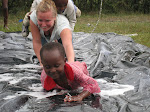9/22 – Currently, it’s the Muslim holy month of Ramadan where Muslims fast from day break to sundown. Not only abstaining from food, pious Muslims will tell no lies, partake in no gossip, have no sexual relations, smoke no cigarettes and will not even drink water during this period. And let me tell you, today was hot. Not only was it hot, but my Tanzanian friends assure me that the next three months will be equally as hot. A conversation I had today:
“Doesn’t it get this hot in the USA?”
“Yes, it does.”
“Right now?”
“Not in a lot of the country. In fact it’s the first day of Fall.”
“So, it’s not hot in America right now?”
“Well, it is – but in the Southwest, like in Texas, Nevada and New Mexico.”
“There’s a NEW MEXICO?”
“Forget it. Yes, it gets this hot in America.”
Then we arm-wrestled and N’Demno threw me into a pile of bricks. Not really. BUT – I have been meaning to write (and sorry for the lack in communication last week. I definitely wasn’t in Zanzibar, lounging on the beach…) that the bricks have been delivered, all 31,250 of them. And man oh man, let me tell you, there are a lot of bricks! It took three trips with a tractor, and even then they had to ask for help from some of the neighbors. Luckily this coincided with my teaching of ‘estimation’, where I asked the class how many bricks there were in one particular pile. My favorite answer: 7 million.
We have since moved past this and the math pupils are doing better and estimating their hearts out. Aside from that, Matonyok has taken on another 14 year-old Maasai girl named Elizabeth from the Arusha region known as Simanjiro. She was meant to marry a 70 year-old Maasai village elder when the regional social worker came to Emmy and N’Demno to ask if they could take her in to prevent this marriage. Both Emmy and N’Demno realized that there was little else for them to do but take her into the family that they have created in Arumeru, and she seems to be adjusting well to the change in environment. I actually have Elizabeth in my math class, and she’s smart as a whip. However, she doesn’t speak any English so there’s another barrier that we’re going to have to overcome. I have no doubt that she’ll be speaking English any time now.
Anyhow, hope all’s well with the readers and I’ll see if I can post some pics by the end of the week.













